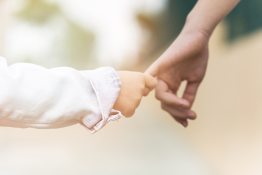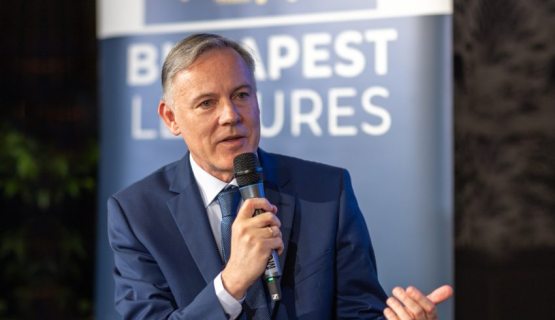Father wound – Male society suffers from a lack of fathers
“It's very good that we are talking about men at all because nowadays we are approaching all issues mainly from the perspective of women's rights. Of course, I support the struggle for women's equality - except for the extreme bends on the gender issue - but we have to be aware that while women have fought for their rights, men have not fought a similar struggle and therefore cannot live their true manhood.,” says Noémi Császár-Nagy, psychologist and clinical and mental health consultant treating adults. For the article about Mother wound, click here.

Why would men have to fight for that which was given to them?
“Because the social role (the patriarchal, male-dominated system) that men – certainly up until the Industrial Revolution – filled does not mean that men would necessarily have understood what they could bear and what they wanted. When a totally male-dominated world still existed, they couldn’t get the best out of it because they lacked consciousness, the awareness of what forces and possibilities are inherent in the socialization of man.
“With the Industrial Revolution, that is, when men left the land and families, unfortunately fathers were removed from the family.
“If the man is removed from the family, the child cannot discover the paternal energy. According to Richard Rohr, Franciscan friar, founder of a movement and author of the two-volume work ‘Wild Man’s Journey’, the father principium or energy is an ancient heritage and not merely a socialization role.
“Being a man is partly a biological fact and partly a socialization gender issue (that is, who they are brought up as), and the outcome of a lot of epigenetic factors (the boy will receive those desired biological and social influences as a foetus and later, from which they finally become a man and father).
“But let’s leave epigenetics out of this and concentrate on what happens in the family when the man leaves his home, does not keep in contact with his parents or wife, does not see his children, only at the weekend or more rarely. Or the modern father who buries himself in his work or his mobile phone, and although physically present is not actively participating in the life of the family or child, and even avoiding eye contact.”
What does this mean as regards the children?
“It means that the child only sees the man’s world through the eyes of the mother. But that does not have anything to do with masculine reality.
“It is like reading about something in the newspaper that we have never come across in life. If we come face to face with a large silverback male gorilla in the zoo, it will have a totally different impact on us than if we saw it only on TV or somebody only talked about the animal. Not to mention the situation when there is no protective barrier whatsoever and we are standing in the wild and actually facing this huge primitive force.
“We can come across mainly heavy-handed father images in the Old Testament, but there is a loving father image in the New Testament because the male ideal embodied in Jesus is vulnerable and shows solidarity: He cures, He turns towards one, and from this aspect we could even consider Him feminine. But if necessary, He uses his influence: He drives the merchants and money-lenders out of the church and fulfils his destiny on the Cross.
“This duality is already evident in the Book of Creation: ‘So God created man in his own image, in the image of God created he him; male and female created he them’.
“There is no mention that man would be closer to God than woman. There is absolutely no gender discrimination in this very first core principle.
“That is, God is neither masculine nor feminine but the two combined. Men require feminine energies just as much as the other way around. If these are not received, then we have distortions, male societies that sometimes urge their members towards extreme behaviour.”
How is this connected with the so-called ‘father wound’?
“In that father image we have been nurturing in our souls for millennia, on the one hand there is the creative, constructive, strong, responsible being, and on the other hand the loving, gentle, retaining, caring being. And the boy whose father is absent from the family never sees anything of this. Instead, he hears of a father that the mother uses to scare him: ‘don’t do that because when your father comes home you will be told off and punished’. He will be brought up fatherless, and on top of it, with an image of a punitive father. This is what we call father wound. Because this is a deficit.
“The self-esteem of a man becomes healthy when he is watched over by his father’s proud eye, his father reinforces him: on the one hand, he expects, and on the other, he praises. The father who cannot be proud of his son profoundly and sincerely, who cannot tell his son off because of a lack of responsibility, when duties are not fulfilled, who cannot be a father expecting with love in the good sense, and warmly restraining, will find his son left hanging in perpetual uncertainty. Because the son does not believe that he can be loved, that he has a value in himself, which is why he always wants to enhance his value with something external, living for the future: ‘If I have a house, and then a wife...’.
“The father wound is a serious life-skill, life-sense and identity problem which men suffer from today – even though they are not aware of it – because they lost their male strength, their connection with their father and grandfather.”
Can the absence of a grandfather also cause father wound? Or to put it the other way round: can the presence of a grandfather compensate for the father?
“The grandfather is important because he is the symbol of the will to live. Because however paradoxical it may appear, the proximity of death brings one closer to the values of life. That is why the grandfather who is present in his grandchild’s life and who was before a father and man himself, can love his grandchild in a way that the child grows up in the knowledge that he represents a sense of life for somebody. Then the child will not seek other goals because he will know that he is on this earth for himself, in his own right, with entitlement to love.”
How else is the father wound manifested?
“A person who has the father wound does not know how to handle, for example, authority. We have to fear God, fear our father not because our mother uses him to intimidate us, but because we deeply respect him and that is why we would like to become like him. Whosoever lives, whosoever ‘downloads’ the model of loving authority, won’t ever be aggressive.
“Since the difference between aggression and deeply experienced dominance, that is between authority and violence, is huge.”
Is the aggressive, misogynistic man frightened of women?
“Yes. In acts carried out against women we frequently find that it is not sexuality but fear behind them. These men do not believe that a woman can love them for themselves, which is why they would rather subjugate the other. Anger, pain, aggression due to absence of fathers, the devaluation of their own masculinity and its counterweighted unhealthy compensation are what men suffer from today. That is why they dare not reach decisions, accept responsibility and risk, commit themselves, acknowledge the woman as a partner of equal status, to marry and have children. Women have fought for all this while the men have not even started the struggle.”
How would it be possible to help them, and should they even be helped?
“Relatively early mortality, high blood pressure, stress, alcoholism all indicate that men need help. There is a need for movements where men receive help in the same way that women had earlier. This is a psychological process, which is why it would be necessary to work out professional help for them using psychology, theology and sociology combined – for instance, life-skill coaching – which leads them to the liberating men’s movements.”
Why is a professional grounding important?
“Because otherwise the movements form into the abovementioned men’s clubs or they will be like that from the outset. For example, we have to be careful that these initiatives do not become movements that follow a charismatic father figure, when somebody standing at the head of the group strengthens his own self-confidence by expecting respect before he states in which direction to continue.
“Men’s groups are full of men suffering from father wound, men who are searching for self-justification from what, or from those, who confirm that they, too, are men. But because this confirmation is not based on an authentic, true, twin-imaged father, but rather on merely a single facet (and even on that only indirectly), in these types of men’s societies the fact is that the blind are leading the blind. Put another way, the father wound can be reconstructed, replaced and settled exclusively through a genuine father-child relationship.”
A last question: what does the absentee father do to girls? That is also a father wound, isn’t it?
“Yes, but its development is totally different. In the identification process, the girl identifies with the mother, as a consequence of which she has to ‘steal’ the father’s heart from the mother. If there is no father present, or she would have to steal the heart of an aggressive father, we get the classical configuration of a (future) lover situation.
“The reason so many women humiliate themselves is because they cannot conceive of themselves in an equal role, because they have never felt that for a father or for a man they are the most important in their own right. After all, the first man that we adore is our father.
“Over the long term and at a social level, it has the same result as father wounds in boys: the gradual destruction of the institution of marriage, the decay of the family and a decline in the population.”






